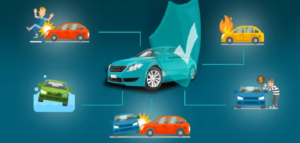What kind of insurance do I need to drive in Michigan?

Nowadays, it’s a very common question: What kind of insurance do I need to drive in Michigan? Today, we will discuss car insurance coverage in Michigan. Types of Michigan’s auto insurance coverage, Michigan’s car insurance cost, Auto insurance claim process, and ways to reduce auto insurance costs in Michigan. In Michigan, third-party liability coverage is the most basic kind of auto insurance, and it is required. It shields you from having to pay for any damages to someone else’s property as the policyholder. If you cause an accident that results in someone being hurt or killed, you will also be covered.
Types of Michigan’s auto insurance coverage

Four Mandatory Types of Auto Insurance Coverage in Michigan
The term “personal liability and property damage” coverage, or “PLPD,” refers to the four forms of auto insurance that are required in Michigan. The minimal insurance coverage stipulated by law is provided by PLPD insurance; extra coverages like collision, comprehensive, and/or UM/UIM are not included.
Personal Injury Protection (PIP): The benefits provided by this coverage are referred to as “No-Fault PIP Benefits.” No-fault PIP payments cover medical costs, a portion of lost income, replacement services (help with household chores), attendant care (in-home nursing services), and other costs if you are seriously hurt in an auto accident.
Property Protection Insurance (PPI): This Michigan auto insurance covers damage you bring to the state of Michigan’s buildings, fences, trees, lawns, and other property, including parked cars. A $1 million PPI is required for every Michigan auto policy.
Residual Bodily Injury Liability (BI): safeguards you if you cause a car accident that leaves another person seriously injured. The law mandates a minimum of $20,000 in business interruption coverage per person and $40,000 per accident before July 2, 2020. Drivers must have minimum BI coverage of $250,000 and $500,000 as of July 2, 2020, unless they specifically select lower limits of $50,000/$100,000. To completely protect oneself, our experts advise you to carry at least $1,000,000 per accident and $500,000 per person. Usually, the difference is just a few extra dollars.
Property Damage (PD): If you damage someone else’s car outside of the state of Michigan, you are covered by this Michigan auto insurance policy. A minimum of $10,000 in PD coverage is mandated by law. Our lawyers advise you to carry at least $100,000, though. For instance, you would be liable for the whole cost of the other driver’s vehicle damage if you were to go to Ohio, a tort state (Michigan is a no-fault state), and you caused the collision.
Six Optional Types of Auto Insurance Coverage in Michigan
You can also choose from several other extra forms of auto insurance in Michigan to safeguard yourself in a variety of situations. The list of possible optional coverage is provided below:
Collision Coverage: Wide, Normal, or Restricted. Learn more about collision coverage here.
Comprehensive Coverage: covers things like fire, theft, and glass damage not caused by a collision.
Uninsured/Underinsured Motorist Coverage: You are protected in the case of an accident by Uninsured and Underinsured Motorist Coverage (UM/UIM) if the other driver has little or no no-fault insurance. Here are some details regarding underinsured motorist protection and underinsured motorist protection.
Mini tort Coverage (also known as Limited Property Damage): This pays for any damage to a motor vehicle up to $1,000 that isn’t already covered by insurance. The maximum mini tort recovery limit for auto accidents that happen after July 1, 2020, will rise to $3,000. Check out our FAQs regarding Michigan small torts.
Gap Coverage: covers the difference between the amount due on an automobile and its current value.
Accidental Death Coverage: If you or a passenger perish in an automobile accident, this effectively serves as life insurance.
Customize your policy using these choices.
Accidental Pardoning After your first at-fault car accident, Nationwide will not increase your auto insurance premiums if you choose this optional policy. Find out more about Forgiving Accidents. Roadside Support Services You can select the type of coverage that best suits your budget from Basic and, two alternative levels of nationwide roadside assistance coverage. Obtain coverage for lockout assistance, fuel delivery, jump starts, and other things.
Loss of use or cost of a rental automobile This coverage assists in covering the cost of a rental car or other related transportation costs if a covered loss prevents you from using your vehicle and allows you to get back on the road.
How are rates calculated?
As soon as you’re prepared to apply When the time comes for you to get insurance, a producer (or insurance firm) will ask you a series of questions and determine whether or not to accept you as a policyholder based on your responses. Underwriting is the term for this procedure. Underwriting criteria based on factors like color, religion, nationality or ethnic group, age, sex, family size, occupation, location of residence, or marital status are prohibited by law from being used by insurance firms to unfairly discriminate. Your answers and the specifics of your situation will be used to calculate the correct premium rate.
The type and age of the car, safety features, where the car is garaged, the average annual mileage, the coverages and limits selected for the policy, and the drivers’ driving records are just a few of the factors that will be taken into account when determining your premium. While credit information cannot be used at the time of renewal, certain businesses do utilize it for underwriting. Insurance companies are legally barred from charging different rates to applicants based on their race, religion, or national origin. They are also prohibited from unjustly discriminating between individuals of the same class and hazard in their prices.
When the time comes for you to get insurance, a producer (or insurance firm) will ask you a series of questions and determine whether or not to accept you as a policyholder based on your responses. Underwriting is the term for this procedure. Underwriting criteria based on factors like color, religion, nationality or ethnic group, age, sex, family size, occupation, location of residence, or marital status are prohibited by law from being used by insurance firms to unfairly discriminate. Your answers and the specifics of your situation will be used to calculate the correct premium rate.
When determining your premium, a few factors will be taken into account, including the kind and age.
Michigan’s car insurance cost?

Michigan’s Average Auto Insurance Rates by Age
It’s inevitable: as you get older, your auto insurance premiums change. Teenagers and young drivers generally pay more for auto insurance because insurance companies consider them to be riskier drivers.
In Michigan, a 16-year-old driver’s auto insurance costs $10,300 a year, whereas a 50-year-old driver’s only pays $2,296.
If you’re worried about getting insurance for a teenage driver, take this into account: The third-most expensive state in which to get auto insurance for a sixteen-year-old is Michigan.
| Age | Average Yearly Premium |
|---|---|
| 16 | $10,300 |
| 17 | $8,186 |
| 18 | $7,387 |
| 19 | $5,294 |
| 20s | $3,194 |
| 30s | $2,496 |
| 40s | $2,454 |
| 50s | $2,295 |
| 60s | $2,339 |
| 70s | $2,727 |
Average premiums for men and women in auto insurance
Car insurance firms utilize sex as a rating component, even though it doesn’t have as much of an impact on premiums as age or state.
Comparing quotes is the best course of action if you believe your present auto insurance provider isn’t offering you the most value for your money.
| Gender | Average Annual Rate |
| Male | $2,492.31 |
| Female | $2,549.84 |
Michigan’s average car insurance costs are broken down by marital status
Aside from the gifts, one advantage of being married is that you usually save money on insurance. Married drivers in Michigan save $3 a month on their auto insurance premiums. This is less than the $6 monthly post-nuptial discount that is the national average.
| Marital Status | Average Annual Rate |
| Single | $2,492 |
| Married | $2,454 |
| Divorced | $2,492 |
| Widowed | $2,492 |
Michigan’s average auto insurance costs for high-risk drivers
Your insurance premiums will increase if you are found to be at fault for an accident or if you are found guilty of a moving infraction. Your auto insurance will cost higher the more red flags you accrue.
In Michigan, your monthly auto insurance rate penalty for your first minor at-fault collision is $90. One of the most serious driving violations, a DUI can result in a $373 monthly increase in insurance costs in Michigan.
| Violation | Average Annual Premium |
| DWI/DUI | $7,095 |
| Reckless Driving | $6,875 |
| At-Fault Accident (<$1,000) | $3,693 |
| At-Fault Accident ($1,000-$2,000) | $3,877 |
| At-Fault Accident (>$2,000) | $3,693 |
| Open Container | $4,599 |
| Speeding (21-25 MPH > limit) | $4,278 |
| Speeding (16-20 MPH > limit) | $4,278 |
Michigan’s Average Auto Insurance Costs by Level of Coverage
The level of coverage you retain determines how much you pay for auto insurance each month. Comprehensive coverage with a low deductible is usually more expensive than liability-only coverage. The pricing difference in Michigan is $903 for full coverage with a $500 deductible compared to liability-only coverage.
| Coverage Level | Average Yearly Rate |
| $100K/$300K/$100K Bodily Injury/Property Damage — Liability Only | $1,488 |
| $100K/$300K/$100K Bodily Injury/Property Damage — $1,000 Comprehensive/Collision | $2,228 |
| $100K/$300K/$100K Bodily Injury/Property Damage — $500 Comprehensive/Collision | $2,392 |
| $50K/$100K/$50K Bodily Injury/Property Damage — Liability Only | $1,432 |
| $50K/$100K/$50K Bodily Injury/Property Damage — $1,000 Comprehensive/Collision | $2,172 |
| $50K/$100K/$50K Bodily Injury/Property Damage — $500 Comprehensive/Collision | $2,336 |
| State Minimum — Liability Only | $1,368 |
| State Minimum — $1,000 Comprehensive/Collision | $2,107 |
| State Minimum — $500 Comprehensive/Collision | $2,271 |
How do auto insurance rates depend on credit scores?
Car insurance rates are significantly impacted by a driver’s credit score. Credit scores are considered by the great majority of insurers.
Five elements that are all related to your past borrowing behavior and present circumstances make up your credit score, commonly known as your FICO Score.
1. History of payments: 35%
2.30% of the total amount owing
3. Credit history length: 15%
4. Variety of credit kinds: 10%
15. 0% new credit
The range of credit scores is 300 to 850. They are frequently separated into multiple levels.
Which auto insurance providers use credit checks?
Every major auto insurance provider runs a credit check on you before to providing a legally binding estimate. Allstate, Progressive, USAA, Geico, State Farm, Allstate, and Liberty Mutual are among them. Few insurance providers don’t run credit checks on you.
Does a credit score impact the cost of auto insurance?
Indeed. Your insurance rate may be significantly impacted by a credit score increase or decrease. Relative to strong credit, annual rates rise by 72% for those with poor credit.
Ways to Reduce Auto Insurance Costs in Michigan

- Compare Quotes: Obtain quotes from multiple insurance providers. Each company uses its formula to determine rates, so prices can vary significantly.
- Bundle Policies: Consider bundling your auto insurance with other policies, such as homeowners or renters insurance, to potentially qualify for a discount.
- Increased Deductibles: A higher deductible usually leads to lower premiums. Just be sure you can comfortably afford the deductible in case of a claim.
- Maintain a Good Driving Record: Safe driving can contribute to lower premiums. Avoid accidents and traffic violations to keep your rates down.
- Ask About Discounts: Inquire about discounts for safe driving, good grades (if applicable), and other factors that may apply to you.
- Drive a Safe and Affordable Car: The type of car you drive can impact insurance costs. Generally, safer and less expensive cars have lower insurance premiums.
- Consider Your Coverage Needs: While looking for affordability, ensure that the coverage meets your needs. Full coverage typically includes liability, comprehensive, and collision coverage.
Don’t forget to customize your insurance to meet your unique needs and circumstances. Reviewing your policy regularly and comparing quotes will help you make sure you’re getting the greatest value.
Auto insurance claim process
Report the Incident: The first thing you should do after an accident or damage is to notify your insurance provider. Usually, you can accomplish this by calling the insurer’s claims hotline, utilizing a mobile app, or going online. Give specifics like the incident’s description, date, time, and location.
Information Exchange: Share details with the people involved, such as names, contact information, insurance information, and car data. Get the details of any witnesses, if there are any. Document the scene with photos, if possible, to provide visual evidence.
File a Police Report: It is wise to make a police report in certain situations, particularly if there are injuries or substantial damage. When processing the insurance claim and assigning blame, this document may be very important.
Claim Adjuster Assessment: The insurance company assigns a claims adjuster to your case. The adjuster will investigate the incident, review the police report, inspect the damages, and assess the costs involved. They may also interview involved parties and witnesses.
Estimate and Repair: The insurance company evaluates the adjuster’s findings to determine whether to declare the car a total loss or to issue an estimate for repairs. The repairs will start if the estimate is approved. While some insurers let you select the repair shop, others have preferred shops.
Medical Claims: If injuries occur, the medical claims procedure starts. This entails providing the insurance company with medical bills, records, and other pertinent paperwork. The kind of insurance and state laws will determine what is and is not covered for medical costs.
Resolution and Payment: The insurance provider will make a payout after the evaluation and repair procedures are finished. This can entail paying for repairs, paying for a totaled car, or paying for medical bills. The resolution process may take several weeks.
Appeals Process: If you disagree with the insurance company’s decision, there’s usually an appeals process. This may involve providing additional documentation or appealing to a higher authority within the insurance company.
The procedure for filing a car insurance claim is intended to assist people in getting over mishaps or unforeseen circumstances. Throughout the whole claims process, it is imperative that you adhere to the procedure exactly, give accurate information, and communicate with your insurance carrier clearly and concisely.
Some advice for accelerating your auto insurance claim
Here are some pointers to speed up the process of filing a claim on your auto insurance.
Download the mobile app for your insurance: Through their applications, a lot of auto insurance companies let drivers submit claims. While each company’s app may have different features and usability, many allow you to attach files such as written statements, images, and supporting evidence to support your claim. Certain applications facilitate the tracking of your claim’s progress.
Compile the required data before submitting the claim: When making a car insurance claim, the more organized you are, the faster you will find the information you need. Delays may result from omitting important information, missing uploading accident images, or not mentioning the other driver’s insurance.
Remember when things are due: The type of auto insurance claim, the insurer, and the location all affect the filing deadlines. As soon as you can after an accident, get in touch with your motor insurance provider to find out if there are any deadlines for submitting paperwork and submitting a claim. To ensure that you don’t forget the deadline, add these to your paper or digital calendar and, if at all possible, attach an alert.
Contact your auto insurance provider again. The severity of the collision, whether more than one motorist was involved, and the amount of time it takes the adjuster to go through all the paperwork can all affect how quickly a claim is settled. It’s easier to make sure everything is on track for settlement if you follow up with your insurance.
Common Myths and Misconceptions About Car Insurance
A lot of myths and misconceptions surround the subject of auto insurance. These false beliefs have the potential to confuse and, occasionally, to cause people to make poor decisions for themselves. Let’s dispel some of these widespread rumors and clear up any misunderstandings regarding auto insurance.
1. Myth: Red cars cost more to insure: The idea that red automobiles cost extra to insure is frequently spread. The truth is that your car’s color has no bearing on your insurance costs. A driver’s history and vehicle make, model, and year are of greater interest to insurers.
2. Myth: Minimum Coverage is Always Sufficient: Some people think it’s always sufficient to choose the bare minimum of coverage. However, in the event of a serious accident, basic coverage might not provide you with enough protection. To improve your financial security, it’s critical to evaluate your unique demands and take into account supplemental coverage.
3. Myth: Your Insurance Covers Everything: Although insurance offers necessary protection, it does not cover every eventuality. It’s important to know the restrictions of your policy. Generally speaking, things like normal wear and tear, mechanical malfunctions, or deliberate destruction are not covered.
4. Myth: Personal Auto Insurance Covers Business Use: Personal auto insurance coverage may not protect you if you use your car for work-related travels. Commercial auto insurance is frequently necessary for business use to guarantee adequate coverage in the event of work-related accidents.
5. Myth: Older Drivers Always Pay More: Many insurance companies give senior citizens discounts, despite the common misconception that older drivers always pay higher prices. Older drivers can frequently receive reduced rates due to their experience and safe driving records.
Clarifying Misconceptions:
1. Misconception: Speeding Tickets Don’t Affect Rates Significantly: Some people believe that a single speeding ticket won’t have a big effect on insurance costs. In actuality, fines for speeding can result in higher insurance rates, and more expensive rates may follow subsequent infractions. To keep insurance costs low, driving safely must be your top priority.
2. Misconception: Credit Score Doesn’t Affect Auto Insurance: Your credit score indeed affects how much your auto insurance costs. Credit history is a common tool insurers use to evaluate a policyholder’s dependability. Better credit makes one more trustworthy and might result in lower insurance costs.
3. Misconception: Comprehensive Coverage Covers Everything: Even though comprehensive coverage is broad, it doesn’t address every eventuality that could arise. It is essential to comprehend the precise contents and exclusions of your policy. For instance, it usually doesn’t cover routine upkeep or mechanical failures.
It’s critical to bust these myths and clear up misunderstandings to make knowledgeable judgments about auto insurance. Policyholders can ensure they have the appropriate protection for their needs and can navigate the market more skillfully by being aware of the reality of insurance coverage.
I believe if you can observe my entire blog, you may get a valid idea of car insurance coverage in Michigan. Types of Michigan’s auto insurance coverage, Michigana’s car insurance cost, Auto insurance claim process, and ways to reduce auto insurance costs in Michigan.
